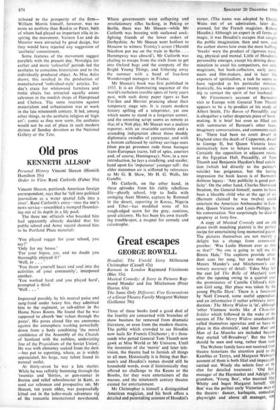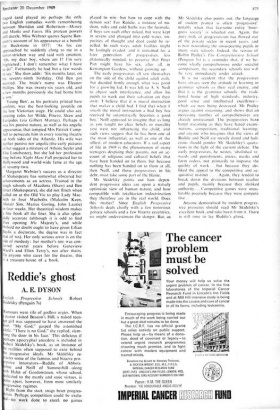Great escapes
GEORGE ROWELL
Houdini: The Untold Story Milboume Christopher (Cassell 42s) Barnum in London Raymund Fitzsimons (Bles 35s)
Musical Comedy: A Story in Pictures Ray- mond Mander and Joe Mitchenson (Peter Davies 63s)
The Same Only Different: Five Generations of a Great Theatre Family Margaret Webster (Gollancz 70s) Three of these books (and a good deal of the fourth) are concerned with branches of show business far removed from dramatic literature, or even from the modern theatre. The public which crowded to see Houdini now hails Sir Francis Chichester ; tl thou- sands who petted General Tom Thumb now gawk at Miss World or Mr Universe. Until the invention of the 'movie' and later tele- vision, the theatre had to furnish all things to all men. Historically it is fitting that Bar- num's and Houdini's names should still be household words, even if histrionically they offered no challenge to the Keans or the Booths, for they were entertainers of the masses, and the nineteenth century theatre existed for entertainment.
Mr Christopher is himself a distinguished American magician, and his book offers a detailed and painstaking account of Houdini's career. (The name was adopted by Ehrich Weiss out of an admiration, later dis- avowed, for the French magician, Robert Houdin.) Although an expert in all forms of magic, it was Houdini's escapes that caught the public imagination, then and now, and the author shows how even the most baffling
'breaks' were the product of rigorous train- ing; physical and mental. Little of Houdini's
personality emerges, except his driving deter- mination to excel his competitors, not only
magicians, but book-collectors, early aero- nauts and film-makers, and in later life exposers of spiritualism, a task he seems to have regarded as his particular mission. Ironically, his widow spent twenty years try- ing to contact the spirit of her husband.
Mr Fitzsimons's account of Barnum's visit to Europe with General Tom Thumb appears to be a by-product of his study of Albert Smith, The Baron of Piccadilly, and is altogether a rather desperate piece of book- making. It is brief but even so filled out with summaries of Barnum's other feats, imaginary conversations, and comments such as: 'There had been no court dwarf in
England since the death of Coppernin, dwarf to George II, but Queen Victoria knew
instinctively how to behave towards one.'
Certainly the opposition in adjacent rooms at the Egyptian Hall, Piccadilly, of Tom
Thumb and Benjamin Haydon's final exhibi-
tion (which led directly to the painter's suicide) has poignance, but the lasting impression the book leaves is of Barnum's dubious legacy : 'Any publicity is good pub- licity'. On the other hand, Charles Sherwood Stratton, the General himself, seems to have
been a likeable child who at the age of six (Barnum claimed he was twelve) could
entertain the American Ambassador in Lon- don, Queen Victoria and LoUis-Philippe by his conversation. Not surprisingly he died of apoplexy at forty-five.
A copy of Musical Comedy and an old piano (with matching pianist) is the perfect recipe for entertaining long-memoried guests.
The pictures themselves are not merely a delight but a change from crossword- puzzles: 'Was Leslie Henson ever as thin as that?' No one is going to tell me its Binnie Hale.' The captions provide abun- dant cues for song, but are marked by
Messrs Mander's and Mitchenson's cus- tomary accuracy of detail: 'Edna May left
the cast [of The Belle of Mayfair] Soon after the opening owing to a quarrel over the prominence of Camille Clifford's Gib- son Girl song. Her place was taken by the
young Phyllis Dare'. There is a foreword by Noel Coward, some useful appendices.
and an informative if rather arbitrary intro- duction: The Merry Widow is 'in', although 'other Viennese works like A Chocolate Soldier which followed in the wake of the success of The Merry Widow unashamedly called themselves operettas and so have no place in this chronicle', and later Hair and Man of La Mancha are included because they started 'off-Broadway'. But the book should be seen and sung, rather than read.
The Webster family have not received from theatre historians the attention paid to the Kembles or Terrys, and Margaret Webster's account of them is both filial and impeccably carried out. Wisely she selects four of the clan for detailed treatment: 'Old Ben. manager of the Haymarket and Adelphi. his grandson, 'Young Ben', who married MaY Whitty and begot Margaret herself. 'Old Ben' was the perfect early Victorian man of the theatre: dancer, harlequin, comedian, playwright and above all manager, staged (and played in) perhaps the only two English comedies worth remembering between Sheridan and Robertson—Money and Masks and Faces. His protean powers still dazzle. Miss Webster quotes Squire Ban- croft's account of his appearance at a benefit for Buckstone in 1877: 'As his cue approached he suddenly clung to me in a terror-stricken way and said with emotion, -Oh, my dear boy, where am I? I'm very frightened ; 1 don't remember what I have to do". Fortunately he had but a few words to say.' She then adds: 'Six months later, on his seventy-ninth birthday, Old Ben got married. The bride's name was Eleanor Phillips. She was twenty-six years old, and a few months previously she had borne him a son.'
'Young Ben', as his portraits printed here confirm, was the best-looking juvenile on the late Victorian stage. He could also act, creating roles for Wilde, Pinero, Shaw and Euripides (via Gilbert Murray). Perhaps it was his passive nature, as well as his angelic appearance, that tempted Mrs Patrick Camp- bell to persecute him in every touring theatre on both sides of the Atlantic. His wife was neither passive nor angelic (the early pictures of her suggest a mixture of Athene Seyler and Elsa Lanchester), but she led her profession long before Night Must Fall projected her to Hollywood and world-wide fame at the age of seventy-two.
Margaret Webster's success as a director of Shakespeare has somewhat obscured her achievements as an actress. Trained in the tough schools of Macdona (Shaw) and Ben Greet (Shakespeare), she did not flinch when called on at the Old Vic to play Lady Mac- beth to four Macbeths (Malcolm Keen, Alistair Sim, Marius Goring, John Laurie) in four weeks. Her theatrical wisdom makes a fine book all the finer. She is also splen- didly accurate (although it is odd to find Tree opening His Majesty's, and while oxford no doubt ought to have given Lilian Baylis a doctorate, the degree was in fact that of MA). Her only-serious error is on the side of modesty: her mother's DBE was con- erred several years before Genevieve Ward's and Ellen Terry's, not after theirs. To anyone who cares for the theatre, this is a treasure-house of a book.



































 Previous page
Previous page